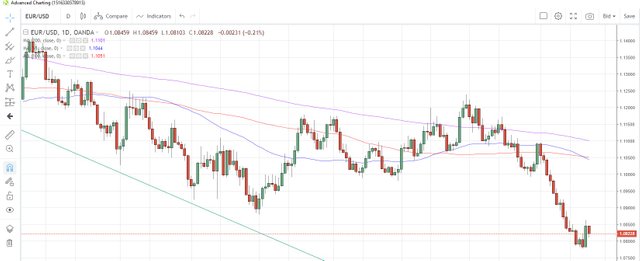Gold At 7-Year High On Virus Fears
Gold spiked higher this morning with safe-haven demand intensifying as the global spread of Co
Vid-19 continues. Equities came under pressure and risk-beta currencies were pressed lower.
EUROPEAN LOCKDOWN?
The number of Co
Vid-19 cases in Italy spiked at the weekend, with the total number of cases now at 157. The surge has caused many outdoor events in the north of the country to be canceled while a travel ban has been implemented affecting 50,000 people southeast of Milan. Some towns around Milan and Venice have been quarantined and Austria has said it is considering closing its border but is still allowing trains through at the moment. New Zealand has extended its travel ban on foreigners arriving from mainland China for a further eight days.
The total number of worldwide cases a is now at 79,360 as at 11.30 am Singapore time with South Korea second in the table behind China with 763 and Italy in third at 157 (Source: John Hopkins University)
EUR/USD is down on the day after posting the biggest one-day gain in almost two months last Friday. A combination of risk aversion, a firmer US dollar and the spike in Italian Co
Vid-19 cases sparked the sell-off. The pair has fallen 0.21% and is now at 1.0823 today.
EUR/USD DAILY CHART
EUR/USD Daily Chart  EUR/USD Daily Chart
EUR/USD Daily Chart
G-20 SEES GROWTH HIT FROM VIRUS OUTBREAK
The communique from the G-20 meeting in Riyadh which concluded at the weekend highlighted that global growth could take a hit from the Co
Vid-19 outbreak as supply chains become disrupted. Finance chiefs vowed to monitor the situation and act if needed, believing that loose monetary policy and decreasing trade tensions would lead to a pick-up later this year and next.
Meanwhile, the IMF predicted that the epidemic would shave 0.1% off global growth. The communique has been followed up this morning by comments from Japan, China and New Zealand saying they stand ready to ease policy if needed.
GERMAN IFO SURVEYS SEEN UNAFFECTED BY VIRUS
It’s a relatively sparse data calendar to start the week, with the highlight being the German IFO surveys for February. The expectations index is seen improving to 93.3 from 92.9 and the business climate is expected to rise to 96.0 from 95.9. Only the current assessment index is seen lower to 99.0 from 99.1.
The US session features a couple of regional Fed indices, with the Chicago Fed national activity index expected to worsen to -0.92 in January from -0.35 the previous month and the Dallas Fed manufacturing business index seen improving to 11.8 in February from -0.2 last month.